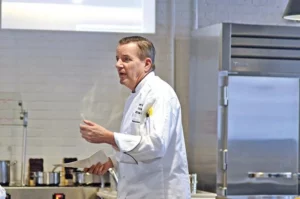A deeper look at the college’s staffing crisis

“We’re on an island right now and all the boats are burning. There’s no help, there’s no one coming to save us at this point. We are just trying to make do everyday with the staff we have.” – Anonymous Dining Hall Employee
With The Bennington Lens’ revamping, it seemed only right to provide a more holistic look into contemporary troubles that the college is facing. At times, I must admit, mismanagement seems to be Bennington’s middle name. Bennington’s botches (both past and present) are brought up constantly in conversation; by student and faculty members alike. Unfortunately, these conversations rarely manifest into something constructive. I found there to be no better place to start exploring multifaceted issues than somewhere that students go everyday: The Dining Hall. Through a series of interviews I set out to write an article that would garner a better understanding for the people on the other side of your plate.
For the past several years, “staffing crisis” has solidified itself as a buzzword around campus. The topic of short staffage seems to be ubiquitous in discussions surrounding a multitude of Bennington’s factions: Buildings & Grounds, Counseling and Psychological Services, The Barn, and even entire departments of study are just too “understaffed.” In passing we say, “We don’t have enough teachers,” “Therapy here is too expensive,” or “We should create new positions within administrations” to better serve pressing conflicts that circulate college life here. These conversations are short lived and most times people don’t have a coherent comprehension of what exactly is disabling us from progressing.
The dining hall is more than just the breeding grounds of a panic attack, it also employs twenty individuals, not counting student’s doing work study. These workers are not directly employed by the college but rather by Aramark, a catering company founded in 1959 and based in Philadelphia. For a closer inspection of the Colleges proximity to the catering company, reference the passage below at Note 12 in Bennington College Short Form FS 2021:
CONTRACT FOR DINING SERVICES:
On March 13, 2013, the College entered a ten-year contract with Aramark Educational Services, LLC (Aramark) to have Aramark provide all dining services for the College, effective July 1, 2013. Under the terms of the contract, the College provides all dining facilities and is responsible for all maintenance and repairs of the facility. Dining services personnel remain employees of the College except for management employees, who are employees of Aramark. Aramark made a $3.5 million payment to the College in July 2014, with the funds to be utilized by the College for dining services improvements. This amount has been recorded as an advance payment on the Statement of Financial Position and is being amortized over the life of the contract as an offset to the dining expense.
In May 2018, the College and Aramark extended their contract for an additional five years. Under the agreement, Aramark paid an additional $1.5 million to the College. This new commitment, along with the unamortized amount from the July 2013 payment, is being amortized over the new extended life of the contract. The amount amortized in fiscal year 2021 is $351,979, leaving a remaining balance to be amortized of $2,455,164.
Said contract has a plethora of difficulties that have ensued. One general consensus is that being under this contract has made it much harder to hire staff. This is obviously not ideal in a current climate where staffing within the hospitality industry is already a nationwide issue. According to RSM, an American audit, tax, and consulting firm, the hospitality industry has lost more than 7.5 million jobs since March 2020. Covid has not been kind to restaurants, hotels, cafes, or college dining halls. The employees that we have now need understanding, compassion, and students to pick up shifts at the dining hall.
Unanimously throughout all my interviews, student engagement and kindness was centered as a noticeable positive to working at Bennington Dining Hall. Workers also take pride in the plethora of healthy food that they have to offer. “Let me start with the pros,” began Chef Steve emphatically. He went on to tell me, “What I realized I wanted to do was to make food from scratch from local farmers… I think my job here is to provide the most healthy experience that I can for students that are studying. As a chef here, you’re constantly learning and that’s the beauty of it. But the downside of that is that it takes a lot of hands to do it.” Sometimes the vision is compromised by the reality.
You may be asking yourself as you read this, where exactly is the dining hall taking its hardest blows? Marisa Wiedl (Cook 1) and Chef Joshua Ruff immediately pointed to the fact that we currently have four cook positions, and some utility positions open. That means, as Marisa said, “We need all hands on deck at all moments of the work day.” At times responsibilities bleed through into other positions. That’s why you see cooks swiping ID cards or can feel the frustration on the other side of those very othering sneeze guards.
On top of the stress created internally; students suffer. The amenities have been slowly disappearing: metal utensils, dinner plates, even their hours of service have been scaled back. Some corners are just no longer able to be covered due to understaffing. According to Chef Joshua Ruff, some dining hall workers are working upwards of “eighty, ninety hours per week” in order for you to have breakfast, lunch, and dinner. The atmosphere they work in is constantly changing, creating an unstable environment. Current employees have reached out to administrations in hopes of having their struggles addressed; still no one is being hired at the rate that we need in order to function in full.
Chef Josh reported to me, “With the short amount of staff we have here, you know, even losing one person on one day has a whole ripple effect. I mean, it can go into the meal period where now I have a chef shut down a station because I don’t have anybody to actively execute that station. It factors into the student experience. I have to reduce the options I’m giving students, which pains me to say honestly.”
The scramble seems to continue and as it continues it delineates. It seems that people on all sides of the equation are being affected: Chefs are not able to deliver the quality of food they want and students lose much needed dietary options. I asked Melissa about her wants for more transparency in her job and she replied, “I would just simply love to know when we are going to bring more people, more workers.” It could possibly be that the college/Aramark are just as in the dark as Marisa, but it’s strange that something that is creating “unhappiness amongst the staff… a divide…” is left up to a waiting game.
In discussions with higher rings of management within the dining hall, I was surprised at what they had to say about the workplace environment. One person remarked, “It is extremely difficult to balance work/life. Some people come in earlier or stay later because there’s just not enough hands to get the work done.” This can mean different things for different workers. Some are on salary, others aren’t, but for either of them working additional hours does lead to burn out. Marisa said, “ I feel like I definitely struggle to fit all the things I need to do with my family, my children’s appointments, my health appointments, things have kinda fallen by the wayside. Unfortunately there’s nothing I can do about that. It’s hard to fit everything in.”
The strenuous work setting is a heavily shared experience. However, I was interested to learn the term, “mandatory overtime,” in my interviews. Even as someone who has worked in and around the hospitality business for their entire lives, this was a new one to me. When workers are catering events (AKA Bennington Works, Family Weekend, Alumni Weekend, etc.) the workers “…only get one day off,” (Marisa) as opposed to the two consecutive ones promised by their contract. The dining hall meanwhile is still serving three meals a day while tending to these bigger and well polished events. Workers can be pushed to their limit, and in one way or another everyone I interviewed expressed a need for more employees.
This situation creates nothing short of a pressure cooker. Marisa said to me, “I, as an employee, have felt like I didn’t want to go and complain unless it was about something big because everyone has their plates full.” At most institutions, you are often made to go through bureaucratic channels of some kind, and the person you’re seeking remains a large and ambiguous question mark. Pushing further, as we are about to see, higher management within Bennington continues to offer hollow blanket statements that can be extremely minimizing.
On September 15, 2022, fifteen people on the staff council signed a letter expressing the dining hall staff’s want for more “attention to issues of understaffing and a pervasive high-stress work culture. ” (September 28: Letter from Bennington Staff Council to “All Staff”).
The letter from September 15, 2022 is as follows:
The Staff Council has asked Angel Kwasniak, our representative, to share the following
message to President Walker and the Board of Trustees at the September 2022 board meeting:
The Staff Council stands for the betterment of the institution and the improvement of staff conditions that serve the student experience, and wishes to embark on an open and transparent dialogue with the administration to obtain answers to questions we may have and find solutions, in good faith, together. There is a pervasive and chronic environment of high stress, which undermines our institutional values of community and work/life balance, has been a simmering pot over the last year, and likely longer with the onset of the COVID-19 pandemic. It is known that over the years, we have received substantial feedback from students regarding the significant role that staff have played in their College experience. An overburdened staff cannot support the students to the level that they deserve.
The Staff Council is of the opinion that the decisions being made regarding hiring of staff, or staffing in general, are compromising the institution and eroding the community upon which Bennington College depends for its success. Numerous staff departures and apparent hiring freezes, and other long standing problematic factors, such as a disproportionate workload expectation, and a shortfall of resource allocation must be addressed in the best interests of the College, and, this especially has led to staff feeling overworked, unheard, and undervalued.
An additional concern is with those departures comes the loss of decades of institutional
knowledge, skill, and experience, as well as collective grieving over the loss of community members. The Staff Council is also aware that the administration has been using multiple hired consultants, which are commonly known to be paid at higher rates than regular full time staff, as a bandaid for the current situation, and only makes the situation more difficult in the face of hiring freeze and department cuts.
We respectfully ask President Walker, College leadership and the board of trustees to take an active role in fully understanding this is an untenable situation, which, unaddressed, will continue to cause harm to the institution, students, staff and faculty. We look forward to a prompt response from the administration in taking action steps in partnership with the Staff Council towards a satisfactory resolution for all.
Sincerely,
The Staff Council Members
“On Friday, September 26, 2022, the President called together her cabinet and the Staff Council in a meeting, which lasted two hours, in order to discuss the matters at hand. President Walker has indicated her intention to work in partnership with the Staff Council and the entire Bennington community to find solutions and take actions to begin addressing these issues in a timely and prioritized manner.” (September 28: Letter from Bennington Staff Council to “All Staff”)
Unfortunately, hearing from a staff member who was at the meeting, the integrity of the statement was undermined by President Laura Walker. Angel Kwasniak was supposed to read the letter aloud but Walker blocked her from doing so. Walker supposedly went on to paraphrase the letter herself in such a way that diminished both their plea and their problem; labeling it another issue to be promptly solved by the “Staff council and the entire Bennington community.” By not allowing for Angel Kwasniak to read the letter as planned, she gave her own summary that left most of the meat out. Yet again, staff felt unheard.
In tense times like these, the student body can help in supporting our workers. In conclusion, if you take anything away from this article: return the damn dining hall plates from your rooms, and for the love of God, bus your own garbage!
As Chef Steve concludes, in spite of all the hardship, “It is what it is and we need to do certain things in order to pivot and keep things moving. We’ll get through this; it’s just a struggle. It’s important work and we just need to keep moving forward as best as we can.”
After conducting all of my research and interviews, while wrapping up this piece I learned suddenly that Marissa quit on October 12th, just days after I spoke to her. The “toxicity of the work environment” was her cited reason. The boats remain on fire and the island keeps getting smaller.





Be First to Comment